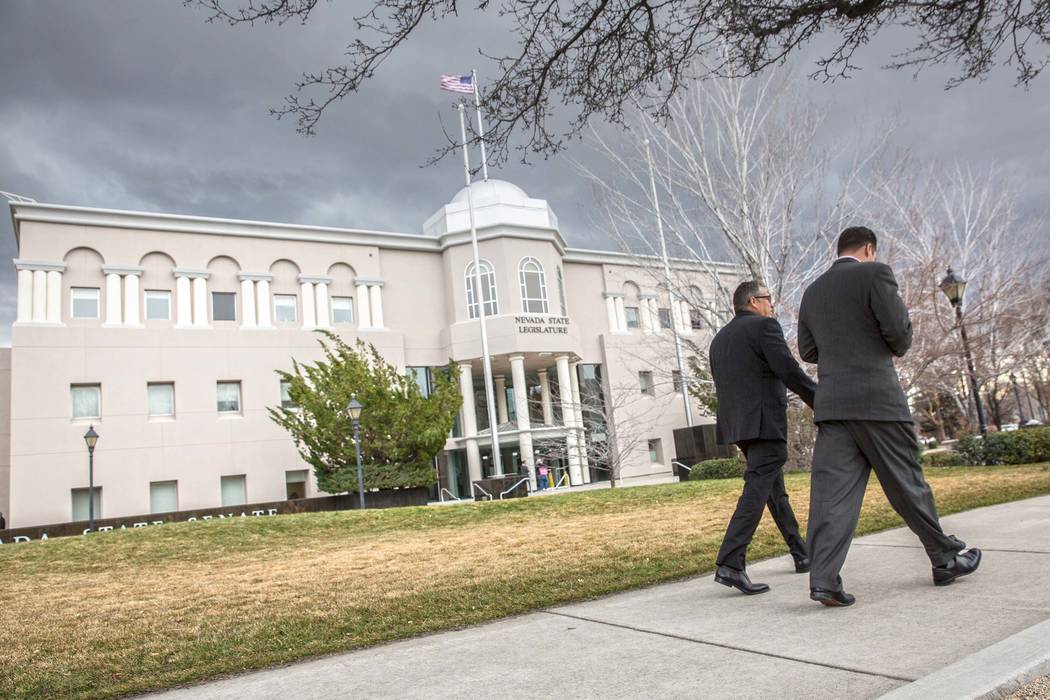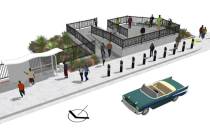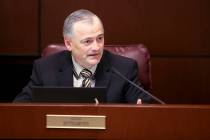Crisis intervention is focus of Nevada mental health bills

Nevada’s behavioral health policy leaders are looking to improve crisis intervention and gather data in the 2019 legislative session.
The four regional behavioral health policy boards, created in 2017, each submitted bills through the Assembly Committee on Health and Human Services aimed at addressing aspects of mental health care in a state where access to it is ranked among the worst nationwide.
“We all worked together … to look and see what was needed in the state, as well as the regions,” said Joelle Gutman, former coordinator for the Rural Regional Behavioral Health Policy Board, who in January left the job to work for the Washoe County Health District. “It kind of turned out a lot of things were needed statewide, they just look a little different depending where you’re at.”
Crisis intervention was a key concern. Three of the four bills address standardization of care and language surrounding mental health crises and creation of service programs.
The bills also look to improve data collection on people who are placed under Legal 2000 holds while in a mental health crisis.
“We’ve been unwilling as a society to talk about mental health issues, and now we finally are,” said Assemblyman Michael Sprinkle, D-Sparks, chairman of the Assembly Committee on Health and Human Services.
Collecting data
The Southern Regional Behavioral Health Policy Board’s bill, Assembly Bill 76, would enhance data collection, document the resources provided to those placed in Legal 2000 mental health holds after discharge, create a publicly accessible database to centralize information on statewide mental health resources and hire a full-time staffer devoted to data collection.
“Over the last 10 years, there’s been just so many different reports and commissions that have met in Southern Nevada, the state as a whole, and almost all of those have produced reports,” said Assemblyman Steve Yeager, D-Las Vegas, who chairs the board, which represents Clark, Nye and Esmeralda counties. “There’s very much a lack of communication and a lack of a centralized hub of information.”
The bill includes provisions to track patients on Legal 2000 holds, from the moment care is initiated through their discharge and after-care. The Review-Journal reported in March that hospitals were releasing patients with mental health issues too soon, including a bipolar suicidal woman who died in a group home the day after her release.
“The endgame would really be making more data-driven decisions on where to spend resources,” Yeager said, so that if a facility provided care resulting in few readmissions into the mental health care system, its efforts could be supported.
The tedious work will likely require attention from a full-time staff member, Yeager said, so the board requested one in their bill, though there’s still no fiscal note attached.
Destigmatizing crisis care
Standardizing the process of a Legal 2000 hold could provide a guideline for patients in a mental health crisis, said Jessica Flood, coordinator for the Northern Regional Behavioral Health Policy Board.
The board, which represents Carson City, Churchill, Douglas, Lyon, Mineral and Storey counties, drafted AB85, which would require the state health department’s board to create regulations for administering medication involuntarily and ask hospitals to draft uniform discharge plans for patients on a mental health hold.
The legislation would also rework language surrounding mental health crises, changing any mention of a “person with mental illness” to a “person in a mental health crisis.”
“If we have really stigmatizing language in the legislation, that reflects in our practices on a day-to-day basis.” Flood said. “It’s just one more step to normalizing mental illness.”
Training first responders
The Rural Regional Behavioral Health Policy Board, which spans Elko, Eureka, Humboldt, Lander, Lincoln, Pershing and White Pine counties, is looking to expand crisis intervention training, which prepares emergency responders to interact with people in a mental health crisis.
The program already runs in Elko and Humboldt counties and has trained about 60 first responders, Gutman said.
“However, it’s costly to do, so we’re asking for money for the training,” she said — $150,000 to be exact, which would allow responders across rural Nevada to travel to Elko or Humboldt for the training.
The aim of AB47, Gutman said, is to ensure that those calling 911 in a mental health crisis aren’t unnecessarily taken to jails or emergency departments.
“Nationwide, we’re seeing that this is a new model that’s working in both urban and rural communities,” she said. “It’s getting people to the appropriate care they need, which isn’t always jail and it isn’t always the hospital.”
In some cases, people only need to be connected to a case manager or need food and shelter, she said.
If passed, Gutman said she expects the measure could help people from cycling back into the hospital and legal systems once crisis and counseling services are provided.
“It’s a modern way of policing and a modern way of providing social services,” Gutman said.
Crisis stabilization
After WestCare, a crisis triage center, closed its doors in Washoe County last April, mental health advocates worried that the area’s struggling residents would end up in hospital ERs and jails.
AB66 calls for the creation of crisis stabilization centers in both Washoe and Clark counties, said Chuck Duarte, the Washoe board’s chair and CEO of Community Health Alliance.
“There was a significant amount of community concern that with the pullout of the crisis triage center … that there really weren’t any options,” he said.
Like legislation coming out of the Rural Nevada Behavioral Health Policy Board, Duarte’s team drafted a bill with the intent of creating services that didn’t reach the level of hospitalization or jail time.
In studying different crisis intervention models nationwide, the board came across one called Crisis Now in Maricopa County, Arizona, Duarte said. The model sends qualifying 911 callers to crisis centers instead of hospitals.
A report commissioned by the National Association of State Mental Health Program Directors, which leads the program, estimated that it saved about $260 million in psychiatric inpatient costs and $37 million in hospital expenses in 2016.
The data, Duarte said, was “extremely impressive.”
The crisis stabilization centers would have a maximum of eight beds and keep patients for up to two weeks. They would be open year-round, around the clock, and use “evidence-based protocols for providing treatment and evidence-based standards.”
The bill includes a provision to collect and manage data from the centers to understand where patients are going after discharge. The bill also calls for two case managers to help coordinate treatment after a patient’s stay.
If it works in Washoe and Clark counties, Duarte said his board would look to launch the centers statewide through legislation in the 2021 session.
“It’ll save money and it’ll save lives,” he said. “I think that’s probably the most important message.”
Before the cost savings, however, the model will require an initial investment. There was no fiscal note attached to the legislation as of early January, but Duarte anticipated one in the near future.
Contact Jessie Bekker at jbekker@reviewjournal.com or 702-380-4563. Follow @jessiebekks on Twitter.













